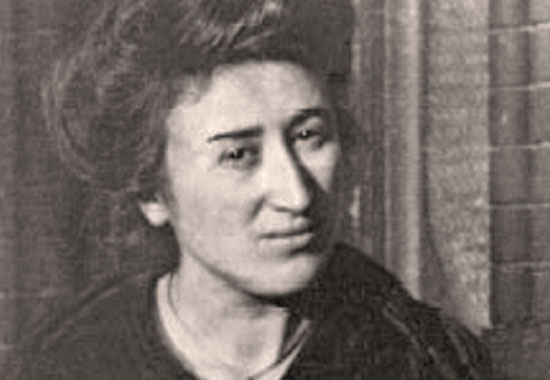|

ROSA LUXEMBURG
1871 - 1919
Marxist
Humanitarian With Guts
Rosa Luxemburg was
nicknamed Bloody Rosa, which gives us a hint.
|
|
Rosa
was a revolutionary and ballsy
enough to criticize
 Lenin
and
Lenin
and
 Trotsky,
for which she had to take a lot of heat,
of course. Trotsky,
for which she had to take a lot of heat,
of course.
There
are two
things that are fact:
One -
Rosa Luxemburg was all-action-no-armchair.
Two -
Rosa Luxemburg never
moved an inch from believing in humanitarianism. |
According to
dictionary, a humanitarian is a person
who seeks to promote human welfare. In other
words, people before rules.
Communism According to Rosa Luxemburg
Luxemburg disagreed with the Polish Socialist Party and hence co-founded
the Polish Social Democratic Party, or the
Social Democracy of the Kingdom of Poland, which
later became
the Polish Communist Party.
Rosa's
interpretation of Marxism is called
Luxemburgism.
Instead of Communists being primarily concerned
about their own country, aka nationalism, Rosa
Luxemburg wanted all Communists to focus first
and foremost on the Socialist world revolution,
aka internationalism. This point was one of the
main differences between Luxemburgism and
Leninism.
Rosa Luxemburg declared
the mass strike a solid tool to achieve
Communist goals, and was opposed to Lenin's
approach which tolerated violence if applied in
pursuit of the greater good.
For more
interpretations of Marxism, see also
 Communism - Luxemburgism
Communism - Luxemburgism
Rosa Luxemburg's Political Party
Luxemburg was also
co-founder of the
 Spartacus League
(in German: Spartakusbund,) which became the
German Communist Party in December 1918.
Spartacus League
(in German: Spartakusbund,) which became the
German Communist Party in December 1918.
Together with
Karl Liebknecht
and others, this group was formed to fight
Germany's involvement in
 World War I, to topple
the government, and to start fresh with a
working class government. Luxemburg saw it necessary
to launch this new faction because the German Social
Democratic Party was supporting Germany's stance
on WWI. She did not.
World War I, to topple
the government, and to start fresh with a
working class government. Luxemburg saw it necessary
to launch this new faction because the German Social
Democratic Party was supporting Germany's stance
on WWI. She did not.
Rosa Luxemburg's
Family
Rosa Luxemburg's father was
Eduard Luxemburg.
Rosa's mother was Line Luxemburg. Rosa's parents were Jewish.
Rosa had four siblings. She was the youngest.
Leo Jogiches
became a close friend.
In 1898, Rosa
Luxemburg married Gustav Lubeck (Lübeck) and moved to
Berlin, Germany.
Rosa Luxemburg's
Death
When it came to protesting in the streets Rosa
Luxemburg took the lead.
It all went down the tubes when she and Karl
Liebknecht were killed by reactionary troops in
the
Spartacus Revolt of January 1919.
Let's face it.
Given the chance, she would do it again.
|
Rosa Luxemburg - Short Biography
|
|
March 5, 1871 |
|
Birth in Zamosc, or Zamosac, Poland (then part of the Russian
Empire) |
|
|
|
|
|
1889 |
|
Emigrates to Zurich,
Switzerland |
|
|
|
|
|
1889 - 1898 |
|
Still in Zurich, she studies law and political
economy, receives a doctorate |
|
|
|
|
|
1898 |
|
Goes to Paris, edits the
Socialist paper Worker's Cause |
|
|
|
|
|
1898 |
|
Marries Gustav Lubeck,
moves to Berlin, obtains German citizenship |
|
|
|
|
|
1905 |
|
Still in Berlin, and as a
member of the German Social Democratic Party, Rosa edits
the paper Forward. |
|
|
|
|
|
1905 |
|
Goes to Warsaw, Poland, to
donate her contribution to the
 Russian Revolution of 1905
Russian Revolution of 1905 |
|
|
|
|
|
1906 |
|
Gets arrested in Poland |
|
|
|
|
|
1907 |
|
Out of jail and back to
Berlin. |
|
|
|
|
|
June and July, 1907 |
|
Jail time in Berlin |
|
|
|
|
|
1907 - 1914 |
|
Teaches Marxism and
Economics at the Social
Democratic Party School in Berlin |
|
|
|
|
|
July 28, 1914 |
|
World War I begins. Check
this event in the
 Timeline of WWI.
Timeline of WWI. |
|
|
|
|
|
July 29, 1914 |
|
Socialist International
Convention at Brussels. Rosa attends. |
|
|
|
|
|
September 1914 |
|
In opposition of the WWI,
Rosa Luxemburg, Karl Liebknecht and others form the
International Group. |
|
|
|
|
|
January 1, 1916 |
|
The International Group
is renamed the Spartacus League. |
|
|
|
|
|
1916 - 1918 |
|
Jail time, Rosa makes good
use of her time and writes The Crisis, see also
 Rosa Luxemburg's Writings.
Rosa Luxemburg's Writings. |
|
|
|
|
|
November 8, 1918 |
|
The German Revolution of
1918 (November Revolution) gets Rosa out of jail |
|
|
|
|
|
January 5, 1919 |
|
The Spartacus Revolt
begins |
|
|
|
|
|
January 15, 1919 |
|
Death in Berlin, Germany |
Rosa Luxemburg's Writings
1889 - Reform or Revolution
1906 - The Mass Strike, the Political
Party, and the Trade Unions
1913 - The Accumulation of Capital
1916 - The Crisis in the German Social
Democracy
1922 - The Russian Revolution
More History
|